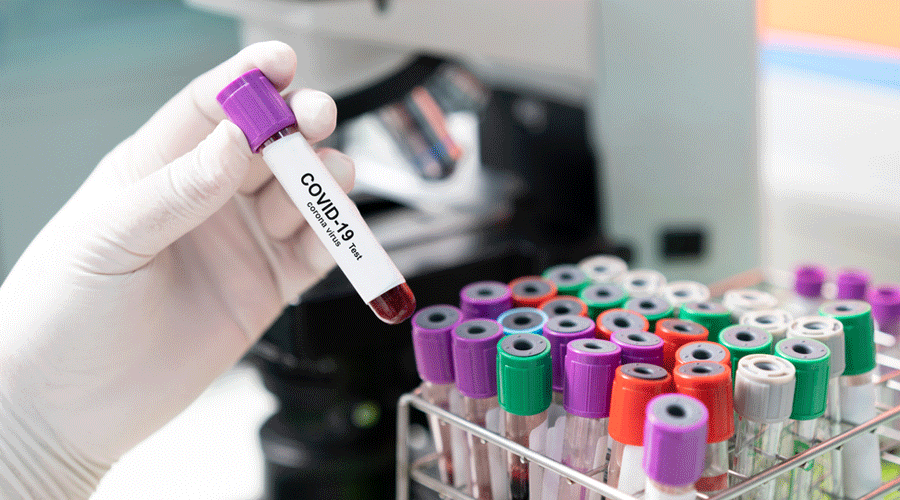Ten cities may have greater proportions of people infected with the new coronavirus than the 23 per cent observed in Delhi by a health ministry agency, a private diagnostic lab chain suggested on Wednesday while the results of a nationwide government survey remain under wraps.
Thyrocare Technologies said 13,036 (17.4 per cent) of 74,809 blood samples its lab network had tested across the country up to July 22 were positive for antibodies to SARS-CoV-2, the microbe that causes Covid-19, implying prior infection by the virus.
The findings from Thyrocare, if validated, would imply that tens of millions of people across India have already been infected by the coronavirus and some cities might be heading towards what experts call “herd immunity” — a situation in which so many people are infected that the virus finds it hard to spread.
Thyrocare’s founder and managing director Arokiaswamy Velumani took to Twitter to post the survey results — 34.2 per cent samples antibody positive in New Delhi, 33.8 per cent in Thane, 32.7 per cent in Madurai (Tamil Nadu), 30 per cent in Chennai, 27.8 per cent in Samastipur (Bihar), 27.6 per cent in Mumbai, 27.3 per cent in Thiruvallur (Tamil Nadu), 25.2 per cent in Valsad (Gujarat), 24.2 per cent in Hooghly (Bengal) and 23.6 per cent in Gautam Budh Nagar (Uttar Pradesh).
The figure for Calcutta is 20.8 per cent and that for Howrah, 21.5 per cent.
The Union health ministry had on Wednesday released the results of a survey in Delhi that found 23 per cent of the sampled population infected by the virus. The findings, public health experts have said, point to a rapid spread of the infection and testing gaps that have left many infected people uncounted.
But the results of the government survey in 60 districts and 10 cities conducted during May remain unpublished. Indian Council of Medical Research director-general Balram Bhargava has for over four weeks sat on requests from researchers to submit the findings to a journal, officials in the ICMR said.
Bhargava had revealed on June 11 at a Union health ministry media briefing that the survey had found an average infection rate of 0.73 per cent. But many experts have underlined that a single number from a multi-district survey appeared intended to hide rather than reveal information.
Under a directive from Bhargava, all ICMR researchers are expected to turn in their research findings relating to Covid-19 for scrutiny by the director-general before submission to any journal, the officials said.
The survey findings were submitted for scrutiny to the DG in June but the researchers who have followed up with requests have yet to receive approval for submission to a journal, multiple officials and researchers have told The Telegraph.
The ICMR did not respond to an email query from this newspaper about concerns among the researchers that the findings have not been approved yet for submission to a journal.
The Thyrocare chain tested samples from people from corporate organisations, residential housing societies and the general population who sought out the antibody tests to determine whether they had been exposed to the virus. Velumani anonymised the data to protect people’s privacy and released only numbers of samples and positives.
Several public health experts have stressed that such a collection methodology relying on people seeking out tests is not random sampling and would yield biased results. “If people come seeking tests, we would expect to see higher than actual prevalence,” said a clinician-researcher who requested anonymity.
But Velumani, who has in 23 days conducted the country’s largest-yet antibody survey to determine what proportion of people are exposed to the coronavirus, is unfazed by concerns about bias.
“We’re trying to understand the extent of exposure to the infection,” Velumani told this newspaper. “We’re trying to answer the questions: where are we today, how far are we from defeating the virus?”
Velumani is aware of the government survey. “I suppose they are awaiting approval from competent authority.”
Multiple public health specialists view the large proportions of infections detected by the Delhi survey and Thyrocare as positive signs pointing to India’s slow move towards herd immunity. Under current calculations, herd immunity is achieved when around 60 per cent of people get infected.
“These large numbers make me feel relieved — we’re moving towards herd immunity,” said Jai Prakash Muliyil, former professor of community medicine at the Christian Medical College, Vellore.
“Herd immunity is not something we seek out. It will come either through a vaccine or through natural infections.”
Muliyil said that as more and more people are infected by the virus, fewer and fewer people will be available to pick up and spread the infection.
“We’re seeing declines in the number of new cases in Mumbai, Delhi and parts of Chennai where infections had plateaued,” Muliyil said.
India on Wednesday recorded 37,724 new Covid-19 cases, raising the total number of lab-confirmed cases to 1,192,915, of whom 411,133 are under medical supervision, 753,050 have recovered and 28,732 have died.
The health ministry said on Wednesday that India’s recovery rate — the number of recoveries divided by the number of lab-confirmed cases — had increased to 63.13 per cent. The case fatality rate — the number of dead divided by the number of confirmed cases — is 2.4 per cent.










